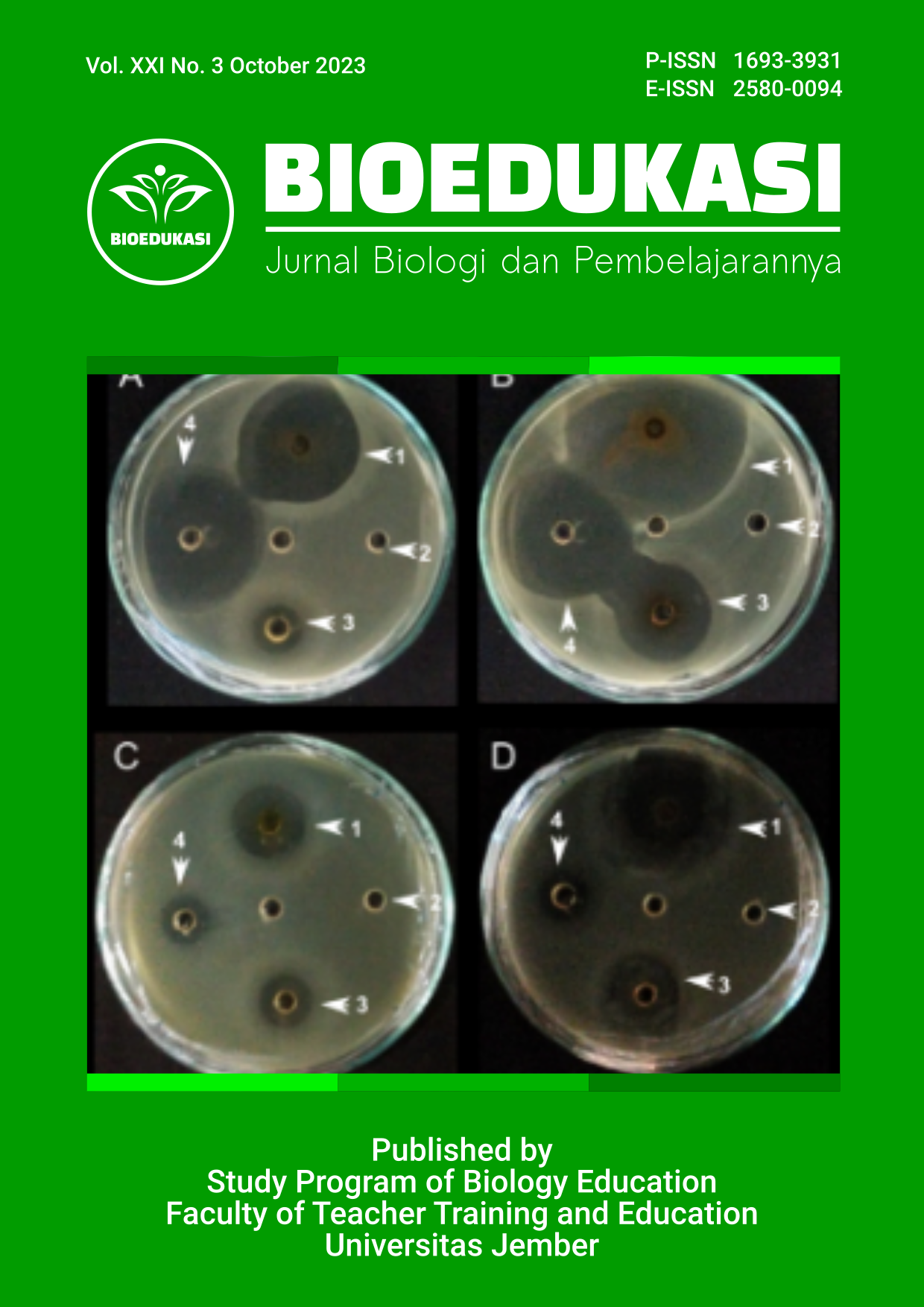Implications Project-Based Learning (PjBL) Assisted Flipped Classroom on Critical Thinking Ability of Gender-Based Students on the Concept of Water Pollution
DOI:
https://doi.org/10.19184/bioedu.v21i3.41215Keywords:
Critical Thinking, Flipped Classroom, Gender, PjBLAbstract
Students' critical thinking abilities are still low for both female and male students. Initial data results obtained from the pretest, female students with a percentage of 35% and male students with a percentage of 27%. The aim of this research is to determine the effect of the project-based learning model assisted by the flipped classroom on gender-based junior high school students' critical thinking abilities on the concept of water pollution. This research uses a quantitative type of research with a sample of class VII students at SMPN 6 Sukabumi City, even semester of the 2022/2023 academic year. The instrument used is a critical thinking skills test. The results obtained show that the average posttest score for female students is 74.2 ± 12.6 and male students is 69.0 ± 11.0. Both of them have increased from the pretest and posttest, but the female scores are superior. The percentage per ability indicator based on gender in indicators 1,2,3 shows that women are superior to men. However, in indicators 4 and 5, women and men are the same. Overall, the data shows that there is no significant difference in learning using the Project Based Learning model assisted by Flipped Classroom between female and male students. However, based on indicators, female students are superior to male students.
Downloads
References
Annisa, 2021. Jurnal Pendidikan MIPA. 11, 18–26.
Ardiansyah, 2020.Kontribusi Tingkat Pendidikan Orang Tua , Lingkungan , dan Kecerdasan Logis Terhadap Kemampuan Berpikir Kritis Matematis. 163–178.
Cahyono. (2017). Analisis Keterampilan Berfikir Kritis Dalam Memecahkan Masalah ditinjau dari Perbedaan Gender. 8(1), 50–64.
Ennis, R. H. (2015). The Nature of Critical Thinking: Outlines of General Critical Thinking Disposition and Abilities. Sixth International Conference on Thinking At MIT, 2013, 1–8.
Fawaiz, S., Handayanto, S. K., & Wahyudi, H. S. (2020). Eksplorasi Keterampilan Penalaran Ilmiah Berdasarkan Jenis Kelamin Siswa SMA. 934–943.
Fuad, N. M., Zubaidah, S., Mahanal, S., & Suarsini, E. (2017). Improving Junior High Schools’ Critical Thinking Skills Based On Test Three Different Models Of Learning. International Journal Of Instruction, 10(1), 101–116.
Hake. (1998). Interactive-Engagement Versus Traditional Methods: A Six-Thousand-Student Survey of Mechanics Test Data For Introductory Physics Courses. American Journal Of Physics, 66(1), 64–74.
Jolanta Lasauskiene and Asta Rauduvaite, “Project-Based Learning at University: Teaching Experiences of Lecturers,†Procedia - Social and Behavioral Sciences 197, 7th World Conference on Educational Sciences (July 25, 2015): 788–792.
Krajick. (2018). Metacognitive Assessment Model for Student Project-Based Learning through the Blended Learning Practice MOOCs.
Lestari et al, 2015. (2015). Peningkatan Kemandirian Belajar Dengan Layanan Bimbingan Kelompok. Jurnal Bimbingan Konseling, 4(1), 1–13.
Miswari et al. (2020). Identifikasi Kemampuan Berpikir Kritis Siswa Kelas X Ipa Ditinjau Dari Indikator Kemampuan Berpikir Kritis Dan Gender. Jurnal Pelita Pendidikan, 8(1), 110–117.
Novitasari, D. 2017. (2017). Analisis Kreativitas Siswa Dalam Pemecahan Masalah Visual Spasial Dan Logis Matematis Ditinjau Dari Gender. Media Pendidikan Matematika, 5(2), 75.
Nur, G. nova sudrajat. (2020). Perempuan dalam Femininitas dan feminitas baru. Journal of Chemical Information and Modeling, 21(1).
Pisa, (2018).PISA Results Combined Executive Summaries. I.
Putri, N. R., Miarsyah, M., & Vivanti, D. (2018). Hubungan kecerdasan naturalis dan motivasi belajar dengan kemampuan berpikir kritis peserta didik pada materi pencemaran lingkungan. Florea : Jurnal Biologi Dan Pembelajarannya, 5(2), 100.
Safitri, I. N. 2016. Analisis Kemampuan Literasi Matematis Siswa Dalam Perpesktif Gender.Skripsi. Program Studi Pendidikan Matematika Universitas Islam Negeri Sunan Ampel. Surabaya
Sugiyono. (2017). Statistika Untuk Penelitian. Alfabeta
Suripta et al,. (2022). Pengaruh Project Based Learning ( Pjbl) dengan Strategi Flipped Classroom Terhadap Pemahaman. 5(3), 265–276.
Thompson, 2011. (2011). Critical Thinking across the Curriculum : Process over Output. 1(9), 1–7.




 https://orcid.org/0000-0003-1920-0515
https://orcid.org/0000-0003-1920-0515